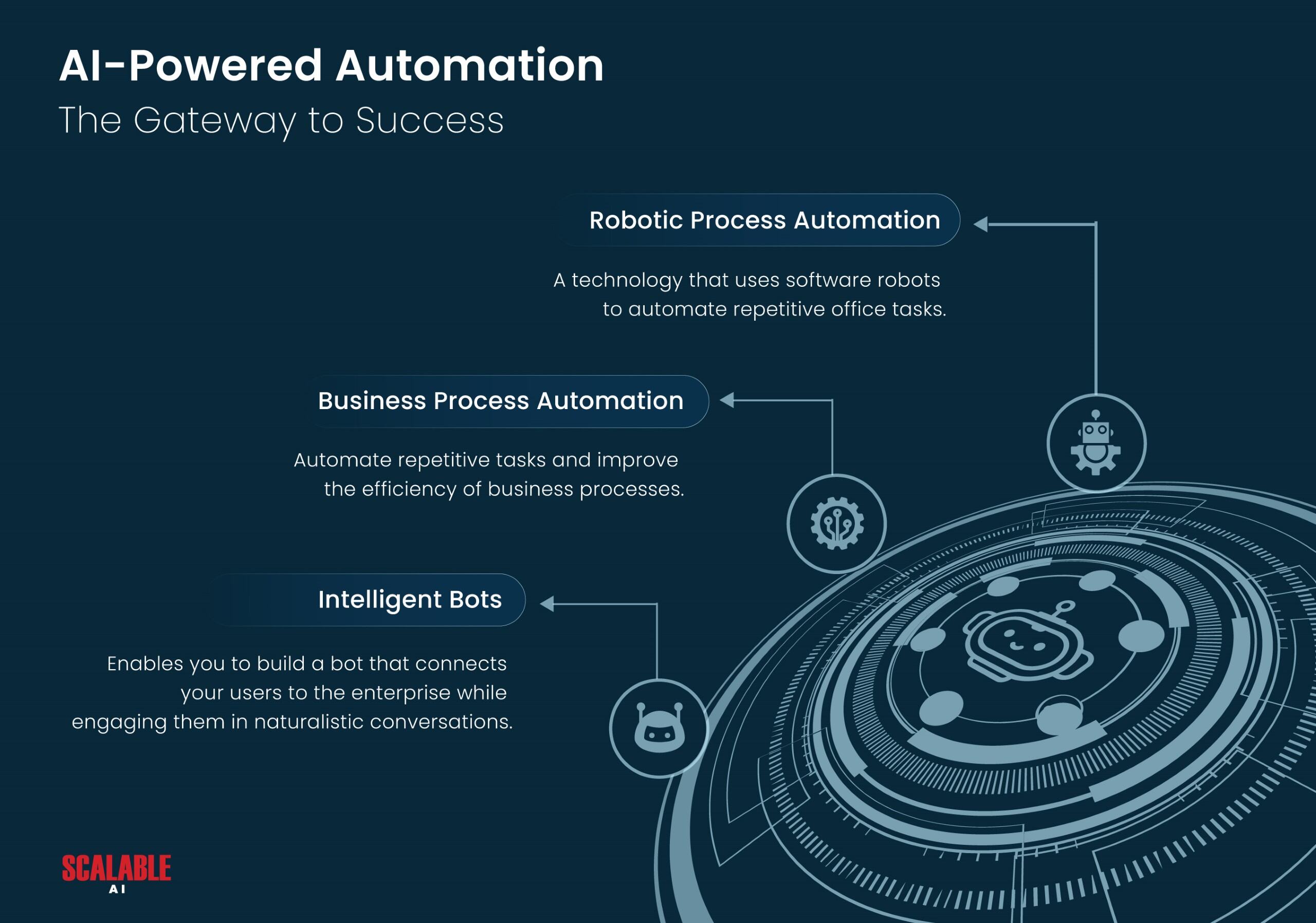Executive Summary:
Robotic Process Automation (RPA) has proven useful for structured data analysis, its limitations in handling unstructured data have become evident. Enter Artificial Intelligence (AI), offering a transformative solution through AI-powered automation, or Intelligent Business Process Automation. By converting unstructured data into formats compatible with RPA, AI enables organizations to break free from traditional manual processes and drive efficiency and scalability. Recent surveys underscore the potential of AI-powered process automation to streamline workflows, delegate tasks to digital robots, and empower employees for higher-value activities, unlocking new levels of innovation and competitiveness. Key areas such as big data management, sales and marketing optimization, and enhanced customer service centers stand to benefit significantly from AI adoption. Embracing AI-powered automation allows businesses to navigate data complexities, drive operational excellence, and deliver personalized customer experiences, positioning them for success in today’s rapidly evolving market.
AI’s Role in Process Transformation
Data management and leveraging its full potential are of paramount concern for businesses today. Many firms turn to Robotic Process Automation (RPA) to tackle big data analysis. However, RPA’s effectiveness is primarily limited to structured data, hindering its broader utility. This is where Artificial Intelligence (AI) steps in as a game-changer. AI possesses the remarkable ability to transform unstructured data into a format readily understandable by RPA. This potent synergy between AI and RPA paves the way for a more powerful solution: AI-powered automation, also known as Intelligent Business Process Automation. Far from being a mere automation tool, AI-powered automation operates as a closed-loop system. It analyzes vast datasets to identify patterns, generate valuable insights, and then utilizes those insights to automate business processes – all with exceptional speed, accuracy, and cost-effectiveness. In essence, while traditional manual processes often restrict growth potential, AI-powered automation, through the intelligent marriage of AI and RPA, shatters these limitations, propelling businesses towards new heights of efficiency and scalability.
Business Potential with AI-Powered Process Automation
Recent findings from a McKinsey survey reveal that nearly half of all business processes hold potential for automation, signaling a transformative shift in the business landscape. By adopting AI-powered process automation, organizations can streamline workflows, delegate repetitive tasks to digital robots, and empower employees to focus on high-value activities. This approach not only enhances productivity and efficiency but also drives improvements across critical areas such as big data management, sales and marketing optimization, streamlined recruitment processes, and enhanced customer service centers. Through the strategic integration of AI technologies, businesses can unlock new levels of innovation, agility, and competitiveness in today’s rapidly evolving market.

Big Data Potential
The exponential growth of big data presents both opportunities and challenges for businesses. As data becomes increasingly vital for driving innovation, productivity, and informed decision-making, organizations must navigate the complexities of intelligent big data management. AI-powered process automation emerges as a solution, enabling businesses to efficiently process, analyze, and derive insights from vast datasets. By leveraging advanced data analysis methods such as descriptive analysis, regression analysis, factor analysis, discriminant analysis, time series analysis, and artificial neural networks, organizations can uncover valuable insights and drive strategic decisions. With AI-driven automation, businesses can effectively harness the power of big data to gain a competitive edge and fuel growth.
Data-Driven Automation
The adoption of AI-powered process automation is driven by the desire to enhance business productivity and streamline operations. By automating repetitive tasks, intelligent process automation frees up human resources to focus on more strategic activities, leading to improved efficiency and productivity. With high configurational logic, software robots execute tasks with precision, minimizing errors and maximizing productivity. Case studies demonstrate significant improvements in data quality and accuracy, highlighting the efficacy of AI-powered robotic process automation (RPA) in data processing tasks. Moreover, leveraging AI for process mining allows businesses to analyze big data patterns, extract insights, and optimize workflows based on factual decision-making. As organizations increasingly rely on data-driven processes, AI-powered automation emerges as a transformative solution for driving operational excellence and achieving business objectives.
Revenue Growth
ECommerce platforms are leveraging artificial intelligence and big data analytics to gain insights into user behavior and preferences. By analyzing customer data, AI algorithms can understand purchasing patterns, identify products of interest, and personalize recommendations to enhance the shopping experience. For instance, when customers browse for products online but abandon their carts during checkout, AI algorithms can strategically recommend those items upon their return to the platform, along with enticing offers to encourage purchase completion. Moreover, AI-driven sentiment analysis enables businesses to gauge customer preferences and tailor promotions, ensuring higher engagement and conversion rates. Through targeted online advertisements, eCommerce stores can further reinforce product recommendations, creating a seamless shopping journey and driving revenue growth.
Wrapping Up
The transformative power of Artificial Intelligence (AI) in organizational processes cannot be overstated. While Robotic Process Automation (RPA) addresses structured data analysis, its limitations necessitate a more comprehensive solution. Enter AI, which excels at converting unstructured data into formats compatible with RPA, giving rise to AI-powered automation or Intelligent Business Process Automation. This symbiotic relationship between AI and RPA unleashes unprecedented efficiency and scalability, propelling businesses towards greater success. As evidenced by recent surveys, AI-powered process automation holds immense potential for streamlining workflows, enhancing productivity, and driving revenue growth across various sectors. By harnessing the capabilities of AI-driven automation, organizations can navigate the complexities of big data management, optimize data-driven processes, and deliver personalized customer experiences.
Read Whitepaper From Silos to Synergy: Building a Smarter Organization
